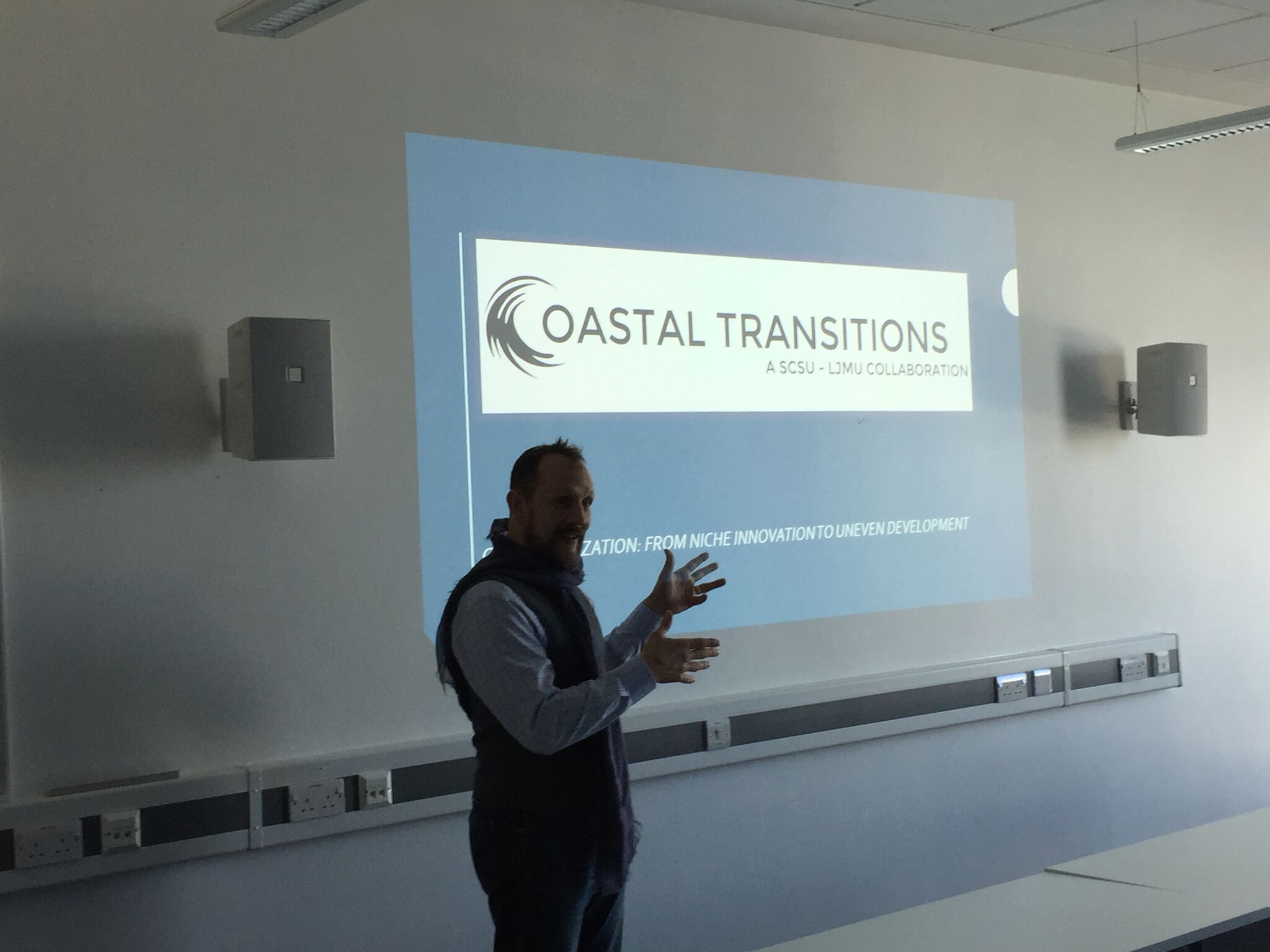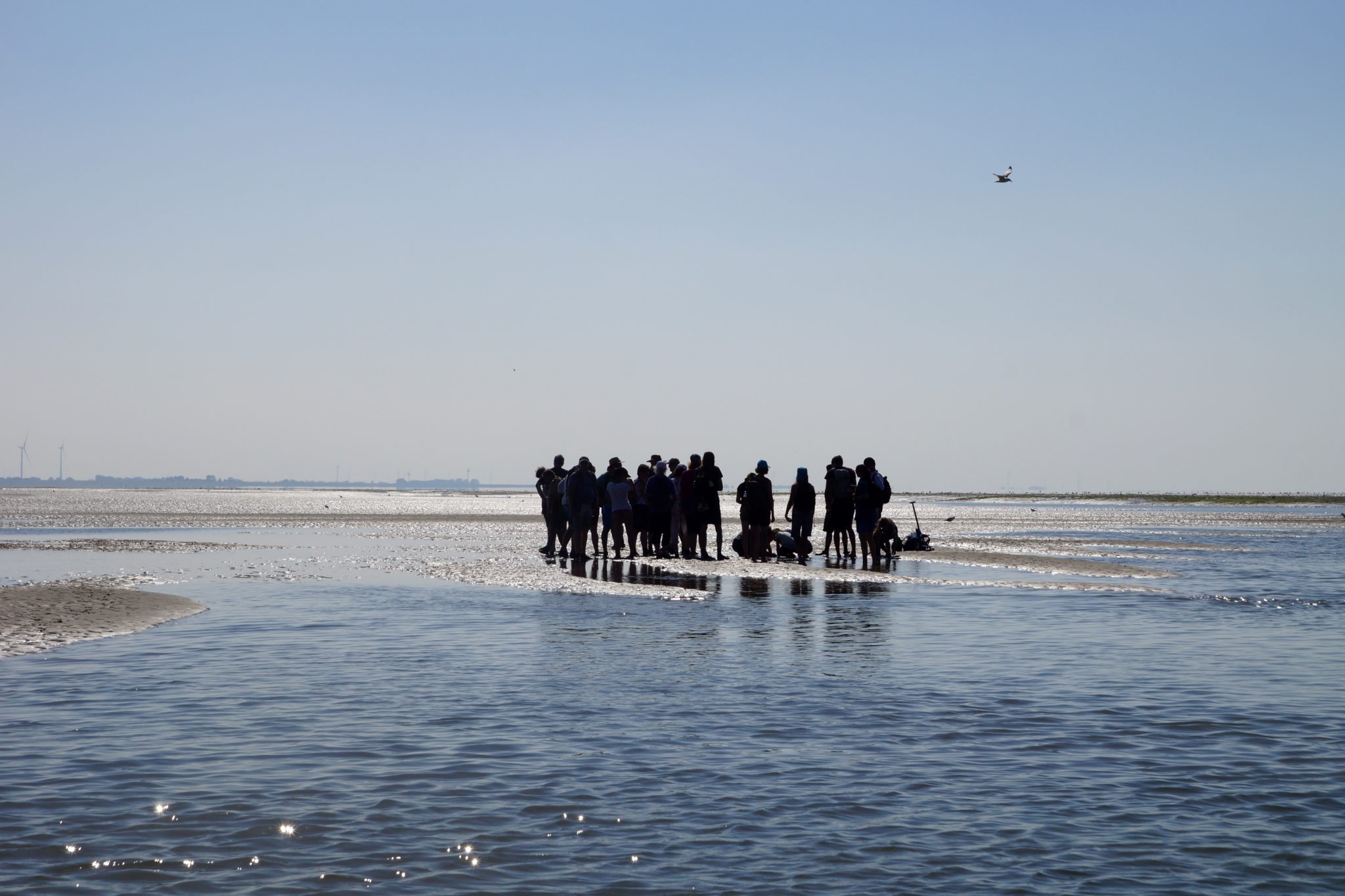Report on the RSA Research Network on Sustainability Transitions in The Coastal Zone
By John Morrissey, Catherine Chambers, and Patrick Heidkamp
The aim of this research network is to interrogate sustainability challenges in the coastal zone from the perspective of the emerging field of socio-technical transitions (STT) research. Socio-technical transitions are defined as major technological transformations in the way societal functions such as transportation, energy and food provision are fulfilled (Geels, 2002). The socio-technical approach to transitions highlights co-evolution and complex interactions between industry, technology, markets, policy, culture and civil society (Geels 2012). A considerable body of research has emerged on STT since the 1990s (Geels, 2002; Geels & Schot, 2007); much of this work argues that policy shifts to longer term perspectives and approaches are critical for environmental sustainability (Geels, 2012; Kemp, Rotmans, & Loorbach, 2007). While these studies frequently consider local contexts (Geels 2012), the spatial dimension in general has been poorly elaborated in transitions studies and according to Murphy (2015), transitions research would benefit from more explicit and refined engagements with concepts such as socio-spatial and socio-technical embeddedness, multi-scalarity, and the role of power in transitions. As described by Hansen & Coenen (2015) sustainability transitions are geographical processes, which rather than being universal and pervasive in nature, happen in situated, particular places and as Truffer and Coenen (2012) point out should be analysed in a regional context. However, much contemporary discussion of transition is either spatial or based on implicit assumptions about spatial homogeneity, with comparatively little attention to how policy proposals will influence current patterns of uneven development (Bridge et al. 2013). In much of the transitions literature, place is represented solely as a site for socio-technical processes, rather than as a heterogeneous and situated construct (Murphy 2015). This represents a major limitation to furthering insights into transition processes. This research network aims to address these limitations through an examination of socio technological transitions with an explicitly spatial focus in the context of the coastal zone.

Four workshops have been scheduled, which will seek to initiate and foster debate and insights:
Workshop 1 – 2017: Theme: Review of Coastal Issues and the Conceptual Basis for Transitions
This first meeting of the RSA network on Coastal Transitions aimed to establish the ‘boundaries’ and potentials of the research network, identifying those aspects of critical importance to further academic and practitioner insight. Spatial understandings of transitions processes, largely neglected by the academic community to date, were front and centre to discussions. The workshop was attended by a small invited group.
January 19th to 21st, 2017
University Centre of the Westfjords, Ísafjörður, Iceland
Workshop 2 – 2017: Theme: Food-Energy-Transportation Systems Transitions
This workshop had a focus on uneven development processes and spatially and socio-spatially differentiated impacts of current trends of dynamic change and transition
September 7th to 9th, 2017
Liverpool UK.
Workshop 3 – 2018: Theme: Governance and Sustainability Citizenship in the Coastal Zone
Coastal zones represent a frontline in the battle for sustainability, as coastal communities face unprecedented economic challenges while coastal ecosystems are subject to overuse, loss of resilience and increased vulnerability. The move from top-down governance to a networked, co-owned model of governance will be explored for international coastal case-studies, with a view to developing understandings of best practice for coastal sustainability governance. Conceptualizations of coastal stakeholders as sustainability citizens, rather than resource consumers will inform the framing of contributions.
September 13th to 15th, 2018
Skálanes, East Iceland.
Workshop 4 – 2019: Theme: Activating Real Coastal Transitions
Applying the transitions concepts of regime transformation and niche-innovation, ‘the case for change’ will be made, seeking to synthesise outcomes from all 4 workshops and identify transformation pathways for coastal regions. A regionally informed understanding of place and space will direct debate to consider problems of uneven transition, and risks of ‘negative transitions’, whereby existing contours of uneven development are exacerbated by transition initiatives. The research network aims to bring together scholars focused on—or interested in— the dynamics of coastal zones as economic spaces in order to catalyse a discourse on new coastal economies, addressing problems of lock-in and system inertia in the current regime and exploring means to foster radical innovation for sustainable and resilience based coastal development all while making sure the spatial dimension and the regional context are fully conceptualized.
12th April to 16th April, 2019
Mary Immaculate College, University of Limerick, Ireland (TBC)
Workshop conveners:
Dr. Catherine Chambers is the director of the Coastal and Marine Management Master’s Program at the University Centre of the Westfjords in Ísafjörður, Iceland. She is an interdisciplinary marine social scientist with expertise in small-scale fisheries, local marine food systems, fishermen’s knowledge, marine tourism, coastal communities, and fisheries governance. Recent publications include “Little kings: Community, change and conflict in Icelandic fisheries” (2017), “Tourism governance for the coastal zone: Reynisfjara beach, Iceland” (2017) and “Viewpoint: The social dimension in Icelandic fisheries governance” (2017).
Dr. C. Patrick Heidkamp is a Professor in, and chair of, the Department of the Environment, Geography & Marine Sciences at Southern Connecticut State University and a visiting Lecturer in the School of Natural Sciences and Psychology at Liverpool John Moores University. He is also the co-director of the Connecticut State University System Center for Environmental Literacy and Sustainability Education and an affiliate of the Economic Rights Research Group at the University of Connecticut. He is an environmental economic geographer with a research focus on sustainability transitions.
Dr. John Morrissey is a Lecturer in Geography at Mary Immaculate College, University of Limerick, Ireland. John’s research is focused on issues of sustainable development, particularly socio-technical transitions, low-carbon development and challenges of low carbon economy for urban and coastal communities. His work is informed by environmental economic geography with a focus on socio-spatial differentiation of transition processes.



